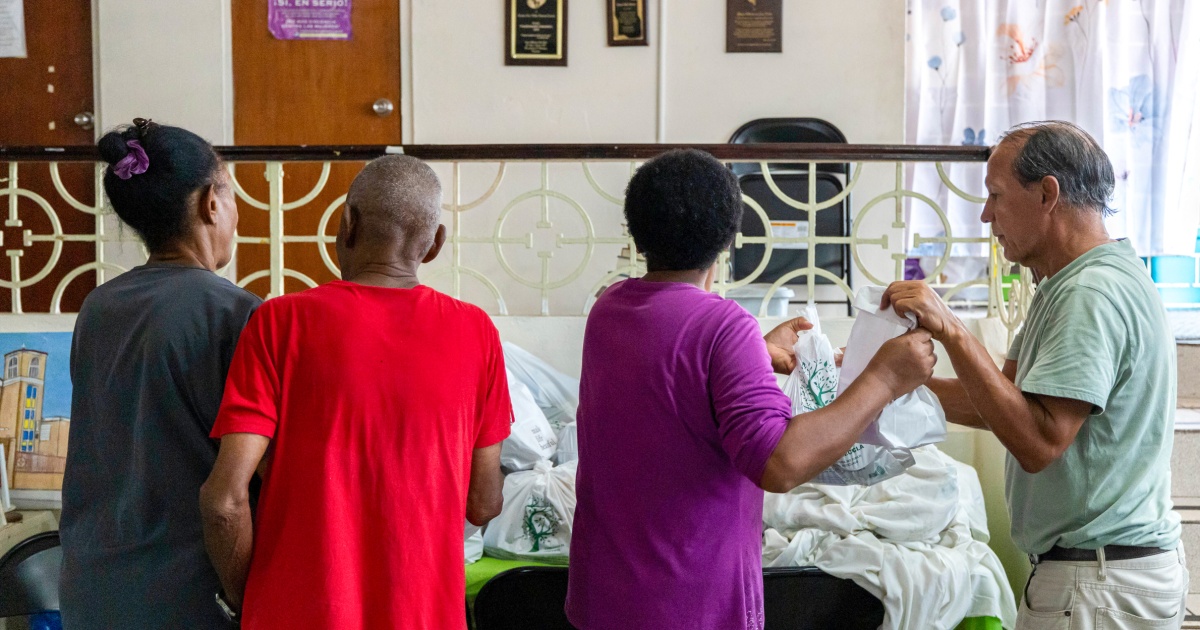
May Day demonstrators in Puerto Rico, May 1, 2025 (Photo by Carlos Berríos Polanco/The Latino Newsletter)
SAN JUAN — A new demand was added to Puerto Rico’s May Day parade this year. Alongside calls for raising wages and strengthening worker protections, demonstrators pushed for migrant protections amid the Trump administration’s immigration enforcement policies.
“This persecution hasn’t stopped. It’s been cruel. It’s been inhumane. It’s undignified. And we don’t think it’s going to end anytime soon,” Liza Gallardo, executive director of Amnesty International Puerto Rico, told The Latino Newsletter.
Gallardo explained that migrants in Puerto Rico tend to work service jobs that keep the economy running, such as agriculture, construction, and elderly care. She noted that recent enforcement operations have bred a culture of fear among many migrants, who now say they no longer feel safe leaving their homes and going to their jobs. This fear means they stop generating income and have to survive off donations from church or community groups.
The majority of migrants in Puerto Rico come from neighboring island countries, particularly the Dominican Republic and Cuba. Although Governor Jenniffer González-Colón initially told the migrant community that President Donald Trump’s immigration enforcement executive orders were focused on the Mexico-United States border and not Puerto Rico, an immigration raid in late January quickly disproved the assertion.
While there has not been a similar large-scale raid since then, federal immigration authorities have continued to arrest and deport migrants without them getting the attention they deserve, several people told The Latino Newsletter. Puerto Rico was once seen as a sanctuary for immigrants, but the ICE raids shattered that perception.
Romelinda Grullón, executive director of the Dominican Women’s Center, explained that many female migrants work in cleaning services or elderly care without a formal contract, which means they are typically paid less than minimum wage. Some have stopped leaving their houses for fear of federal immigration authorities. Meanwhile, others have been told by their bosses not to come into work, she said.
Migrant Workers in Puerto Rico
There is not much data on migrant workers in Puerto Rico specifically, but across the United States, undocumented migrants make up nearly a quarter of agriculture workers, construction laborers, and house cleaners, according to the Pew Research Center. The same data shows that immigrants —regardless of their status— outnumber U.S. citizens in some jobs, such as manicurists and taxi drivers.

May Day demonstrators in Puerto Rico, May 1, 2025 (Photo by Carlos Berríos Polanco/The Latino Newsletter)
The lack of migrant labor could lead to long-term labor shortages in industries where they are heavily represented, a report from The Center for Migration Studies of New York (CMS) noted.
José Rodríguez, executive director of the Dominican Committee of Human Rights (CDHR), said that a lack of migrant labor will have a negative impact on the Puerto Rican economy, particularly as a coming recession looms
“If [a migrant] doesn’t go take care of your elderly, today, you can’t go to work,” Rodríguez said.
He said he had been approached by several migrant laborers who wanted to leave Puerto Rico, but were afraid of being arrested and detained by federal immigration authorities.
Separately, Grullón also mentioned that some migrants wanted to leave Puerto Rico to return to the Dominican Republic. The Latino Newsletter previously reported that at least eight undocumented migrants had been arrested while trying to do that.
At least one more undocumented migrant has been detained while trying to return to their home country, according to public court records. Human rights organization Kilómetro 0 said a migrant died while in ICE custody this February, shortly after being arrested.
On Monday, the Department of Homeland Security announced that any undocumented migrant who uses the CBP Home app to self-deport will receive a $1,000 stipend after returning to their home country.
Immigrants, particularly undocumented ones, are at risk of labor exploitation in the U.S. and around the world because many are afraid to come in contact with federal agencies to report a labor violation for fear it would affect their ability to stay in the country. Wage theft is common in industries with a large presence of migrants.
Rodríguez, director of the CDHR, believes the targeting of migrants by federal immigration authorities will eventually affect Puerto Ricans as well. The January raid included two migrants with regularized status; one was held in immigration detention for two days. In the United States, there have been reports of Puerto Rican families being detained.
“We all live here, and what affects one of us will affect all of us,” Rodríguez said.
Carlos Berríos Polanco is a journalist from Puerto Rico covering climate, conflict, and the intersection of the two.
We want to keep The Latino Newsletter accessible without paywalls. To help, you can donate here. Any amount (one-time or monthly) will keep us going.
What We’re Reading
Pulitzer Love: Congratulations to two opinion writers we love to read on being named Pulitzer Prize finalists on Monday.
First up, Marcela García of The Boston Globe, who shared this on Threads:
Next is Gustavo Arellano of The Los Angeles Times.
If you haven’t caught Gustavo’s conversation about his Pulitzer finalist work, this is the show.
Here is the complete list of winners and finalists.
Do you believe in creating new journalism lanes for Latinos and Latinas? Do you believe that U.S. mainstream outlets will never understand our community? Consider donating to The Latino Newsletter. Any little bit helps to keep this newsletter free and accessible to all. ¡Gracias mil!








